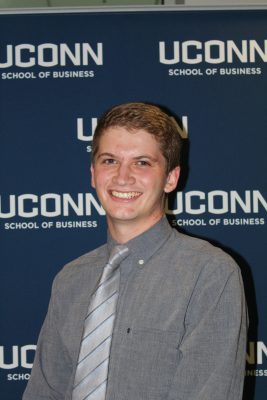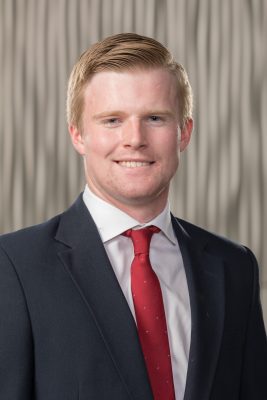 Raised in small-town East Granby, CT, Andrew Eastman (MIS ‘20) has always had a passion for technology. In addition to high-school sports and extracurriculars, his grade-school hobbies included building computers and modifying video games with his friends. While working with technology influenced his upbringing, using technology applications to solve business problems or to create unique experiences for others was, and continues to be, his primary motivator. After taking multiple high-school-level business classes and enjoying the experience, he knew he wanted to pursue a degree in business. Touring UConn and learning more about the Management Information Systems (MIS) major during his senior year, he realized the MIS program was a perfect fit for him. “It combined my interests in business and technology,” he said. “And since I graduated in a class of sixty-or-so kids, I was excited about UConn’s size and diversity.”
Raised in small-town East Granby, CT, Andrew Eastman (MIS ‘20) has always had a passion for technology. In addition to high-school sports and extracurriculars, his grade-school hobbies included building computers and modifying video games with his friends. While working with technology influenced his upbringing, using technology applications to solve business problems or to create unique experiences for others was, and continues to be, his primary motivator. After taking multiple high-school-level business classes and enjoying the experience, he knew he wanted to pursue a degree in business. Touring UConn and learning more about the Management Information Systems (MIS) major during his senior year, he realized the MIS program was a perfect fit for him. “It combined my interests in business and technology,” he said. “And since I graduated in a class of sixty-or-so kids, I was excited about UConn’s size and diversity.”
Once at UConn, Andrew sought after every possible way to pursue his interests and develop his professional skills. He saw every opportunity as a way to improve, learn, and mature into a more complete adult. This led him to join many different business organizations, including the Information Management Association (IMA). He found the IMA to be a great way to meet other technology-oriented students, learn more about the IT field, and network with professionals. He also participated in many case competitions including the PwC Case Competition, the MIS Case Competition, and, more recently, the Hanover Image Analytics Challenge. “I definitely recommend doing case comps,” he said. “They’re fun and you usually get to work on a real-world problem, so it’s a great way to get some experience under your belt.”
During his junior year, Andrew became the treasurer of the IMA. The purpose of IMA, as briefly mentioned above, is to bridge the gap between UConn students and IT opportunities, regardless of their major. “As treasurer, you manage all the financials of the organization, but it’s not only about doing my job. It’s also about meeting new students, professionals and building connections,” he explained. When asked what being part of the IMA e-board taught him, he answered the following: “The role taught me how to coordinate efforts with many different people, organizations, and to work as a team with other E-board members. It also helped me improve my public speaking and presentation skills.”
This past summer, Andrew interned at MassMutual as an IT business analyst. As part of his role and summer project, he assisted in the development of a large database. His objectives were to convert three of the company’s database systems into one master database. He also had to update the new database from its outdated version. Andrew conveyed the needs of his specific team with help from the functional knowledge he acquired. His work also had many project management elements, including the use of scrum and agile methodologies within the company.
Now that Andrew is finishing up his last two semesters of college, he feels prepared for life after undergrad. “MIS definitely helped me find out what I wanted to do,” he said. “The fact that there are so many resources provided is huge.” Specific to the Operations and Information Management department, he’d like to shout out Jon Moore: “He’s a great resource. He can help you with anything MIS related, whether it be course selection, general advice, or finding an internship or job.”
For students currently interested in MIS or beginning to pursue the major, Andrew offers this advice: “Definitely get involved with MIS events as soon as possible. The major offers incredible opportunities, and if you take them you’ll definitely have a leg up on the competition. Utilize the resources in the Gladstein Lab [to teach yourself emerging technologies] and participate in IMA functions to hear about potential employment opportunities. Don’t be afraid to step out of your comfort zone. Experience is extremely valuable.”
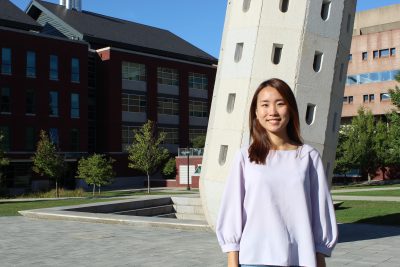 Born and raised in Manhattan, NY,
Born and raised in Manhattan, NY, 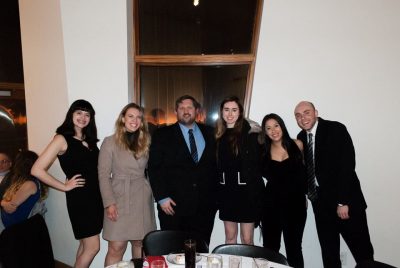 On Wednesday, April 10th, the University of Connecticut’s Operations and Information Management (OPIM) Department sent a team of talented students to participate in the University of Minnesota’s (UMN’s) CoMIS case competition. In order to qualify for the trip, each student had to take the Business Case Competitions independent study (OPIM
On Wednesday, April 10th, the University of Connecticut’s Operations and Information Management (OPIM) Department sent a team of talented students to participate in the University of Minnesota’s (UMN’s) CoMIS case competition. In order to qualify for the trip, each student had to take the Business Case Competitions independent study (OPIM 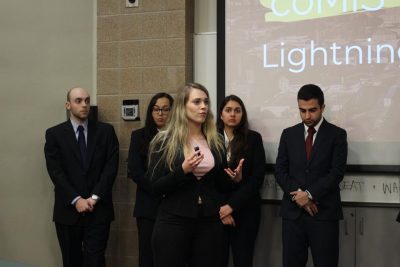 On day two, students and faculty were invited to partake in one of two tours: a tour of the Federal Reserve Bank of Minnesota or a tour of the U.S. Bank Stadium. Both were interesting snapshots of what Minneapolis had to offer and allowed competing schools to mingle with each other while experiencing something new. “The U.S. Bank Stadium definitely lived up to the hype,” said Gauthier. “Every aspect of the modern fan experience was covered and integrated with top class engineering and [information technology] solutions.” For the Federal Reserve Bank tour, both Moore and Kridzelis enjoyed learning about the Federal Reserve System and how artificial intelligence (A.I.) is helping workers count, transport, and sort money.
On day two, students and faculty were invited to partake in one of two tours: a tour of the Federal Reserve Bank of Minnesota or a tour of the U.S. Bank Stadium. Both were interesting snapshots of what Minneapolis had to offer and allowed competing schools to mingle with each other while experiencing something new. “The U.S. Bank Stadium definitely lived up to the hype,” said Gauthier. “Every aspect of the modern fan experience was covered and integrated with top class engineering and [information technology] solutions.” For the Federal Reserve Bank tour, both Moore and Kridzelis enjoyed learning about the Federal Reserve System and how artificial intelligence (A.I.) is helping workers count, transport, and sort money.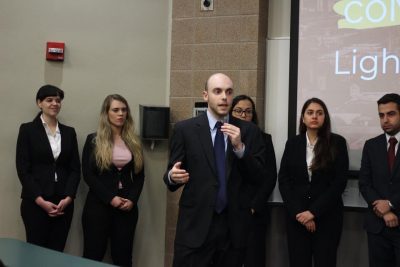 When CoMMIT finally presented in front of their panel of judges, the professionalism that emanated from each team member masked any unease they were experiencing during the fifteen minutes they were given. Due to the creativity of CoMMIT’s solutions, they were able to get second place out of all teams in their randomized bracket for the preliminary round (which included three winning schools from the year before). This meant that they had a chance to go to finals through a question-and-answer lightning round. Unfortunately, they did not advance beyond this point, but ended up achieving seventh place overall “Our team stayed for a short time, but managed a good showing against steep competition,” said Moore. “Although there were times where I felt I would nearly fall down, I always had a teammate ready to pick me back up,” followed Trautman.
When CoMMIT finally presented in front of their panel of judges, the professionalism that emanated from each team member masked any unease they were experiencing during the fifteen minutes they were given. Due to the creativity of CoMMIT’s solutions, they were able to get second place out of all teams in their randomized bracket for the preliminary round (which included three winning schools from the year before). This meant that they had a chance to go to finals through a question-and-answer lightning round. Unfortunately, they did not advance beyond this point, but ended up achieving seventh place overall “Our team stayed for a short time, but managed a good showing against steep competition,” said Moore. “Although there were times where I felt I would nearly fall down, I always had a teammate ready to pick me back up,” followed Trautman. Raised in Wallingford, Connecticut, sophomore management information systems (MIS) major
Raised in Wallingford, Connecticut, sophomore management information systems (MIS) major  Growing up in Milford, Connecticut, junior management information systems (MIS) major
Growing up in Milford, Connecticut, junior management information systems (MIS) major 
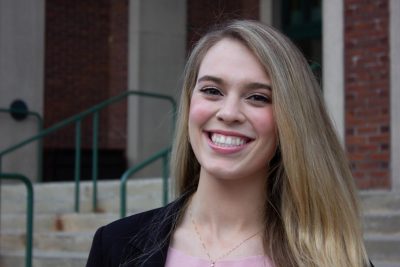 Originally from Neshanic Station, New Jersey, junior management information systems major
Originally from Neshanic Station, New Jersey, junior management information systems major  Hannah Bonitz
Hannah Bonitz
